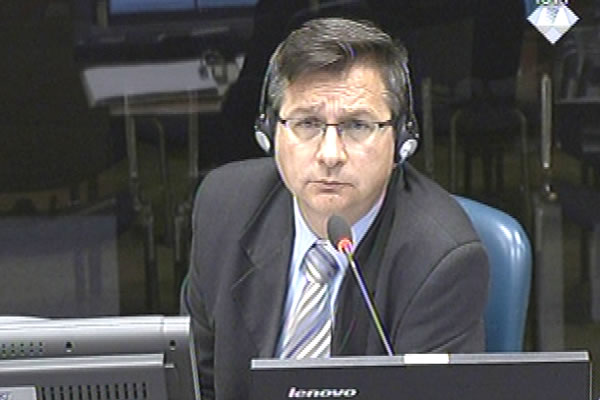Home
HISTORIAN CORRECTS GRAMMAR
Mladic’s defense expert, historian Milos Kovic has criticized the prosecution and its experts, claiming that they have erroneously used several terms. The term ‘Bosnian Serbs’ is not correct, because some of these people come from Herzegovina, Kovic stressed. According to him, it was not correct to use the term the ‘siege of Sarajevo’ because the city had access to the outside world through the UN troops. Also, there was no ‘terror’ against the Sarajevo citizens because the Serb artillery and snipers targeted the army and the objective was to divide the city
 Milos Kovic, defence witness at Rako Mladic trial
Milos Kovic, defence witness at Rako Mladic trial Milos Kovic, a historian from Belgrade, has written two reports at the request of Ratko Mladic’s defense. In the reports Kovic ‘scientifically criticizes’ the work of the prosecution experts. In the first report, Kovic analyzes the claims made by Patrick Treanor about the actions of the Bosnian Serb leadership from 1992 to 1995. In the second report Kovic criticizes the reports by Robert Donia on the siege of Sarajevo and the activities of the Republika Srpska Assembly during the war in BH.
At the beginning of the examination-in-chief, the defense counsel asked Kovic why, in his view, the use of the term ‘Bosnian Serbs’ was ‘incorrect from the historical and professional point of view’. Treanor used the term in the title of his expert report. The witness explained that the phrase was an insult to the local Serbs. The proper term is ‘Serbs from Republika Srpska’, Kovic said. Furthermore, Kovic emphasized, some people come from Herzegovina as not all Serbs are Bosnians. As he went on with his evidence, the defense’s historian used the phrase ‘Bosnian Muslims and Croats'. The presiding judge didn’t miss that, asking whether the term was not insulting to Muslims and Croats. Some of them also come from Herzegovina, the presiding judge asked. Muslims ‘don’t insist on such distinctions’, Kovic retorted. As far as Croats were concerned, it was 'just a nuance,' although in fact they have not really bought into the ‘Bosnian idea’.
According to Mladic’s expert, there was also a serious terminological problem in the title of Donia's report. The term ‘siege of Sarajevo’ was controversial, Kovic noted. There was no siege of Sarajevo because during the war the city had access to the outside world through the UN troops. In fact, only the center of Sarajevo was encircled by the Serbs, not the entire city. ‘Here, if you were to state that The Hague consisted only of the city centre, then you would have the siege of The Hague’, Kovic specified.
In the cross-examination, the witness said that the term ‘terror’ was also not proper. The word has been used in the indictment to describe the artillery and sniper campaign against the Sarajevo civilians. Kovic explained that the BH Army units were targeted. The Bosnian Serb leadership and Mladic’s army wanted to divide Sarajevo and it was not their intention to terrorize the civilians.
What the accused intended during the war in BH could be seen in his statements to the media, the prosecutor argued. The prosecutor presented Mladic’s interview to the Belgrade magazine NIN from the war-time period. In the interview Mladic called Muslims ‘converts to Islam’ and ‘the worst scum’. The witness explained that the interview was ‘war propaganda’, and not what the accused really believed in. The prosecutor asked if Mladic’s statements could be linked to a Sarajevo-Romanija Corps report drafted in 1994 and signed by Luka Dragicevic. According to the document, Serbs were ‘genetically better, stronger, handsomer and smarter’ than Muslims because the latter were ‘converts to Islam’, descendants of the ‘weakest of Serbs’. One doesn’t need to be a historian to see ‘certain similarities’ between Mladic’s and Dragicevic’s words, Kovic replied.
The historian from Belgrade states in his report that BH President Alija Izetbegovic was swayed by the US to reject Cutilheiro’s plan despite the fact that the plan had been an opportunity for a peaceful division of BH within its borders. Kovic also quoted from the book by Warren Zimmermann, a former US ambassador to Yugoslavia. In Zimmerman’s words, the Americans encouraged Izetbegovic to do that. The truth is rather more complex, the prosecutor countered, invoking other statements made by Zimmerman. For example, Zimmerman wrote that the US decided to support the rejection of the plan only after they learned about the agreement between Tudjman and Milosevic, presidents of Croatia and Serbia, to carve up BH. According to Zimmerman, the information made Izetbegovic ‘very angry’. Kovic remarked that Zimmerman ‘disagrees with himself’ because he said something else in his statement to the US media. Also, the prosecutor noted, Ratko Mladic mentioned the division of BH in his war diary. Taking notes at a meeting on 26 October 1992, Mladic wrote down the words of Croatian general Slobodan Praljak. ‘We are right on track to force Alija to agree to the division of BH’ and ‘it is in our interest for Muslims to get a canton of their own to have a place to move to’. At that time, the war was ‘well under way’, and the warring factions had their own goal they pursued. Muslims wanted to keep a unitary state, while Serbs and Croats wished to divide it, Kovic explained.
The defense expert will continue his evidence tomorrow.
Linked Reports
- Case : Mladic
- 2015-11-25 EVERYONE IS TO BLAME FOR SREBRENICA GENOCIDE EXCEPT MLADIC AND KARADZIC
- 2015-11-24 AKASHI'S 'THINKING OUT LOUD' ABOUT MLADIC
- 2015-11-23 'QUANTUM DIFFERENCE' IN CRIMES
- 2015-12-01 HOW WITNESSES IN VOJISLAV SESELJ’S CASE WERE MADE TO ‘CHANGE THEIR MINDS’
- 2015-12-01 DIFFICULTIES UNDERSTANDING CRIMINAL PROCEEDINGS
- 2015-12-03 CONTESTING REPORTS ON SREBRENICA EXHUMATIONS
